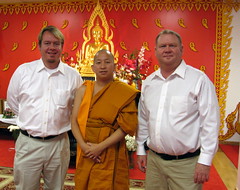This is part 5 of Suriya "Nuk" Chitchulanon's journal describing his Buddhist ordination ritual and subsequent monkhood.
---
Daily Activities
During the transition from a layperson to a monk, I noticed that people reacted toward me differently. For example, everybody wai'd me regardless of age or gender, women are not allowed to touch me, laypersons used special phrases to address me as a monk, etc. I could not believe my life was changed instantly and my lifestyle was now shaped so as to support Buddhist spiritual practice, to live a simple and meditative life, and attain nirvana.
A typical day for Thai monks - they get up at 5:00am and get ready to go out on the alms round. They come back around 6:30am and have breakfast around 7:00am. Some temples do morning chant after breakfast, some do at 5:00am. At 11:00am, it is a lunch time and evening chant is normally at around 5:00pm or 6:00pm depending on the temple. The rest of the day is free time. They can do anything they like.
For my daily activity in the temple, I normally got up at about 4:30am and spent 10 to 15 minutes to tie on my robe. Putting on a monk’s wardrobe is not as easy as it looks and it, for some monks, could take up to at least one month to know how to wear their robes properly. For a few days, I asked other monks to help and teach me how to wrap this robe tight and secure and fit to my body. Each monk had his own way to wear his robe. At around 5:00am, a monk struck the temple bell to notify all that it was time for morning chanting. All monks including myself sat in front of a big Buddha statue and start chanting for 30-45 minutes. In the quiet environment, the sound of chanting was amazingly harmonious, melodious and peaceful, and my mind was somewhat hypnotized by the melody of the scripture. It was just a truly refreshing every time when I did morning and evening chant. Then we did meditation for 10-15 minutes. Meditation did help my mind focus, relieve stress, and calm my body. in most meditations my leg got numb due to “lotus sitting”. That was one thing that I need to keep practicing.
At 6:30am I went to the main hall for a breakfast preparation. There were 2-3 volunteers cooking breakfast and lunch for the monks. Unlike Mahayana Buddhist, Thai monks - Theravada - are allowed to eat many meats. Therefore, each breakfast or lunch consisted of meat dishes, veggie dishes, as well as thai dessert and fruits. I had to admit that every meal was really very good and I appreciated the chefs time and efforts to help carry out the temple activities. Breakfast started at 7:00am with a few prays. After breakfast, I normally took a shower, read and studied Buddhist texts, talked to the abbot, and sometimes took a nap.
Between 10:30am and 11:30am, it was a time to set up plates, spoons, forks, drinks; then lunchtime, and cleaning the dishes afterward. This was going to be the last meal of the day so I had to ensure I had enough food to avoid hunger at night. Yes, one of the 227 precepts is to abstain from eating outside the “proper time”. Traditionally, the “proper time” is from dawn until midday. From noon until dawn the following day, the Bikkhu is expected to fast. Fasting means avoiding solid foods (or anything that is chewable) but not liquids such as coffee, tea, juice, milk, etc.
In the afternoon, it was free time until 5:00pm. I normally spent time to read Buddhist books, or study Buddhist doctrine and scripture in the Pali language. Sometimes I chatted with the other monks, watched news on the internet, swept around the temple, cleaned the floor, or took a short nap. During this free time, I realized some things that I never before contemplated such as self discovery, happiness, monkhood lifestyle, meditation, real world versus religious world, etc.
At 5:00pm, the bell sounded began, all monks gathered in the Buddha room for evening chanting. It was basically similar to morning chanting except reciting different scripture. It was peaceful indeed.
In the evening, there were not many activities after evening chanting. I spent my precious time training my mind and learning Buddhist doctrinal principals and tenets, and practice the whole discipline as much as I could. There are so many things to learn and most of them not in the books. My normal bed time was 9:30pm.
Continued...
Part 1, 2, 3, 4, 5, 6, conclusion.

No comments:
Post a Comment